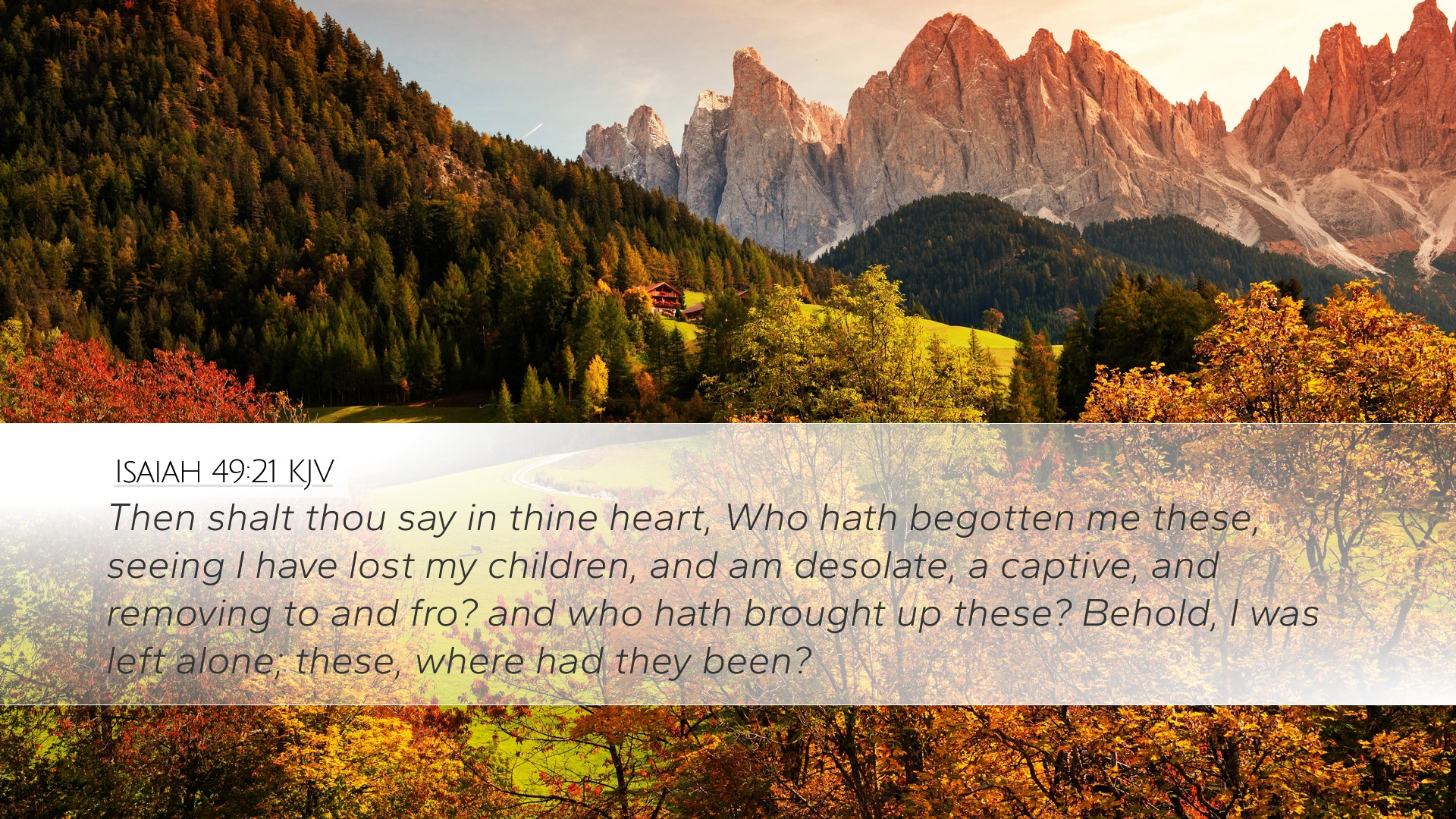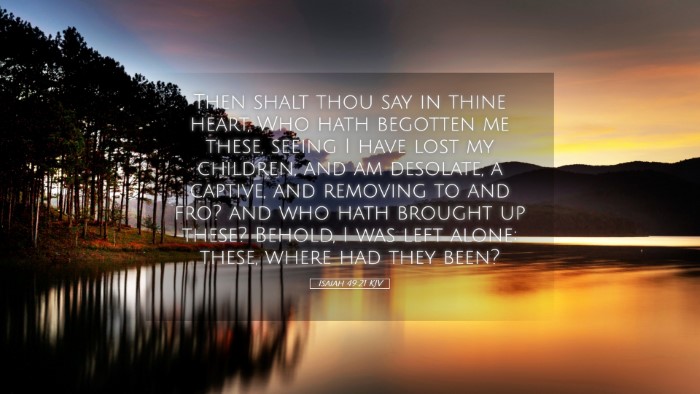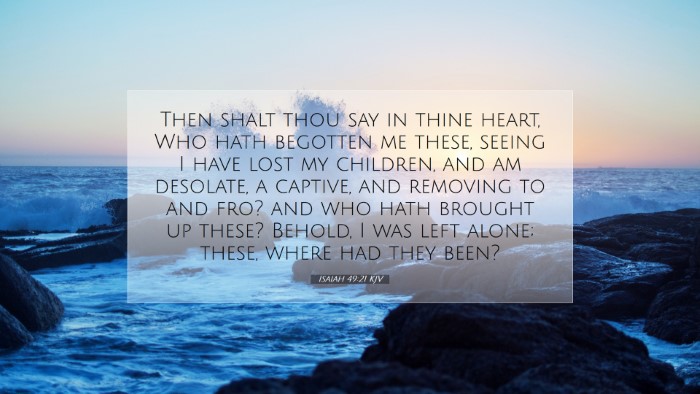Commentary on Isaiah 49:21
Isaiah 49:21 states: "Then you will say in your heart, 'Who has borne me these? I was bereaved and barren, exiled and rejected. Who brought these up? I was left all alone; but these—where have they come from?'" This verse encapsulates profound themes of hope and restoration, reflecting the deep emotional landscape of the exiled Israelite people. The following commentary synthesizes insights from notable public domain sources, namely Matthew Henry, Albert Barnes, and Adam Clarke, to explore the significance of this verse for contemporary readers.
Contextual Background
To fully grasp the meaning of Isaiah 49:21, one must consider the historical context of the passage. The Book of Isaiah is set against the backdrop of the Babylonian Exile, during which the Israelites faced profound despair and loss. The preceding verses of Isaiah 49 speak of God's promise of restoration and redemption for Israel, assuring them that they have not been forgotten despite their current circumstances. The imagery in this verse evokes the feelings of a mother reflecting on her children, highlighting a relationship that is both intimate and deeply personal.
Insights from Matthew Henry
Matthew Henry emphasizes the deep sense of astonishment and joy that the Israelites will experience upon recognizing their restoration. He remarks that the phrase "then you will say" signifies a time of realization, when the people will clearly see God’s providència in their lives:
- Affirmation of Identity: This realization comes with a recognition of their identity as God’s chosen people, even after enduring hardship.
- God’s Unfailing Care: Henry notes that the passage reflects God's continuous care for Israel despite their idolatry and forsaking of Him.
- Transformation of Loss: The bereaved and barren state of Israel is contrasted with the abundance of children which signifies redemption and hope.
Insights from Albert Barnes
Albert Barnes brings forth a detailed analysis of the rhetorical question posed in this verse. He suggests that the inquiry "Who has borne me these?" indicates a miraculous act of God, where He fulfills His promises to revive and regenerate His people:
- Imagery of Motherhood: Barnes notes that the imagery employed reflects a mother’s joy upon recognizing her children, underscoring the deep emotional perspective of longing and fulfillment.
- Recognition of Divine Intervention: The questioning nature of the verse reveals that the people will come to understand that it was God who has provided what they once thought impossible.
- Community Restoration: The shift from individual despair to a collective celebration of new life demonstrates the transformative power of God’s grace.
Insights from Adam Clarke
Adam Clarke offers a broader theological reflection on the significance of knowing that God brings forth new life from desolation. He posits that:
- Divine Sovereignty: Clarke emphasizes that the restoration of Israel is an act of God's sovereign will, orchestrating circumstances beyond human comprehension.
- Hope in Despair: He highlights the essence of hope embedded in the verse, signaling that even in the bleakest of times, divine intervention can lead to miraculous outcomes.
- Future Fulfilling Prophecy: Clarke draws attention to the prophetic nature of this scripture, suggesting that its implications breach the boundaries of time, encompassing not only Israel but also the Church as God's covenant community.
Theological Implications
The implications of Isaiah 49:21 extend beyond its historical context into theological reflections significant for pastors, students, theologians, and biblical scholars today:
- God’s Faithfulness: The verse reassures believers of God's unwavering faithfulness, even in times of exile and sorrow.
- Restoration and Redemption: It posits a central theme found throughout Scripture: God delights in redeeming His people and actively working toward their restoration.
- Corporate Identity: The communal aspect of the verse encourages readers to view their struggles and triumphs in light of their identity as part of the body of Christ.
Practical Application
For contemporary readers, especially within pastoral and scholarly circles, Isaiah 49:21 prompts deep reflection on how one perceives God's activity in their lives and communities:
- Encouragement in Trials: Believers can find encouragement in recognizing that their present struggles may very well precede a season of joy and abundance.
- Ministering to the Bereaved: Pastors can draw from this verse when ministering to those who feel abandoned or desolate, reminding them of God’s unfaltering promise of restoration.
- Community Building: The idea of recognizing divine provision can inspire church communities to celebrate their collective journeys and the growth that arises through trials.
Conclusion
Isaiah 49:21 encapsulates the transformative journey from exile and loss to restoration and fulfillment, offering profound insights not only for the Israelites but also for all who seek God. By engaging with the commentaries of Matthew Henry, Albert Barnes, and Adam Clarke, believers can appreciate the richness of this passage as it speaks to the heart of God’s redemptive plan. It stands as a beacon of hope, encouraging us to embrace our identity as God’s people, confident in His ability to bring forth life where there once was barrenness.


